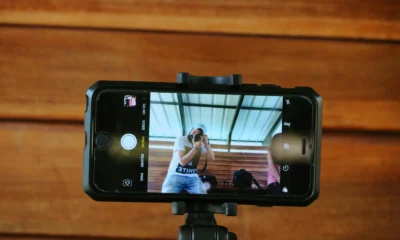Entertainment
Drake Exits the US

Bolanle Media
hello@bolanlemedia.com
Bolanle Media is a leading media and entertainment company, providing news, insights, and analysis on the latest developments in the industry. Our team of experts delivers up-to-date information on music, film, and celebrity news, keeping you informed and engaged. With a focus on accuracy and reliability, Bolanle Media is your go-to source for entertainment news and updates.
Entertainment
Adults, Fame, and a Four-Year-Old: Critics Question Ms. Shirley’s Exposure to Grown Men

Starkville, Mississippi — The viral rise of 4-year-old LaR’iyah Jesireé, better known as “Ms. Shirley,” has captivated millions on TikTok and Instagram. But as her fame grows, so too does a wave of public concern—particularly over her appearances at meet-and-greet events attended by adults, including grown men, raising urgent questions about child safety, parental responsibility, and the blurred boundaries of social media stardom.

A Viral Sensation in the Spotlight
Ms. Shirley’s infectious line dances, especially her signature “Boots on the Ground” routine, have made her a household name in the world of social media. With over a million followers and appearances on national television, she’s become a symbol of youthful talent and joy.
But behind the viral videos lies a controversy that has split public opinion. Critics argue that the very events fueling her fame—public meet-and-greets, often at venues not designed for children—expose her to adult environments and attention that are inappropriate for someone her age.
The Flashpoint: Meet-and-Greet Backlash
- Adult Attendance: Social media erupted after images and videos surfaced of Ms. Shirley participating in meet-and-greet events where the majority of attendees were adults, many of them men. Critics questioned the wisdom of placing a young child in such settings, with some calling it “gross and exploitative”.
- Parental Decisions Under Fire: The backlash intensified as Ms. Shirley’s mother, Latisha Tucker, defended her choices online, insisting she remains a protective parent first. “I’m a mother… before anything,” Tucker said in response to critics, but detractors remain unconvinced, pointing to the risks of adult attention and the potential for exploitation.
Safety, Exploitation, and the Role of Social Media
- Child Safety Concerns: The controversy has led some observers to report the family to Child Protective Services, citing fears over Ms. Shirley’s exposure to adult audiences and the pressures of internet fame at such a young age.
- Debate Over Exploitation: For every fan who sees a proud mother sharing her daughter’s talent, there are others who see a child being thrust into the limelight for adult entertainment. Critics warn that the combination of viral fame and adult-dominated events could have lasting consequences for Ms. Shirley’s well-being.
- Online Reactions: The internet is divided—while many celebrate Ms. Shirley’s talent, others voice discomfort at seeing a toddler perform in spaces where alcohol and adult behavior are present. Some question why a 4-year-old is being branded with a mature-sounding stage name and presented in such grown-up contexts.
The Mother’s Response
Latisha Tucker, Ms. Shirley’s mother, has not shied away from the criticism. She maintains that her daughter’s appearances are carefully managed and that the backlash is fueled by outsiders who misunderstand their intentions. Tucker has publicly stated that any earnings from Ms. Shirley’s fame will be set aside for her future, and insists that her daughter is simply “being a kid like any other kid.” Still, she acknowledges that the scrutiny comes with the territory of internet celebrity.

A Broader Conversation
The uproar over Ms. Shirley’s meet-and-greets is part of a larger debate about the responsibilities of parents who share their children’s lives online, the adequacy of social media safeguards, and the potential for exploitation in the pursuit of viral fame. As platforms like TikTok continue to blur the lines between childhood and celebrity, the story of Ms. Shirley stands as a flashpoint—one that forces parents, platforms, and audiences alike to confront uncomfortable questions about where to draw the line.
Table: Key Issues in the Ms. Shirley Controversy
| Issue | Description |
|---|---|
| Adult Attendance at Events | Grown men and other adults present at meet-and-greets, sparking safety concerns |
| Parental Oversight | Debate over whether Ms. Shirley’s mother is protecting or exploiting her child |
| Child Safety | Reports to CPS and public calls for better safeguards for young social media stars |
| Online Division | Fans celebrate her talent, critics warn of long-term risks and inappropriate exposure |
As Ms. Shirley’s star continues to rise, so does the scrutiny. For now, her story remains a cautionary tale at the intersection of childhood, celebrity, and the unpredictable power of the internet.
Business
Nicki Minaj Demands $200 Million from Jay-Z in Explosive Twitter Rant

Nicki Minaj has once again set social media ablaze, this time targeting Jay-Z with a series of pointed tweets that allege he owes her an eye-popping $200 million. The outburst has reignited debates about artist compensation, industry transparency, and the ongoing power struggles within hip-hop’s elite circles.

The $200 Million Claim
In a string of tweets, Minaj directly addressed Jay-Z, writing, “Jay-Z, call me to settle the karmic debt. It’s only collecting more interest. You still in my top five though. Let’s get it.” She went further, warning, “Anyone still calling him Hov will answer to God for the blasphemy.” According to Minaj, the alleged debt stems from Jay-Z’s sale of Tidal, the music streaming platform he launched in 2015 with a group of high-profile artists—including Minaj herself, J. Cole, and Rihanna.
When Jay-Z sold Tidal in 2021, Minaj claims she was only offered $1 million, a figure she says falls dramatically short of what she believes she is owed based on her ownership stake and contributions. She has long voiced dissatisfaction with the payout, but this is the most public—and dramatic—demand to date.
Beyond the Money: Broader Grievances
Minaj’s Twitter storm wasn’t limited to financial complaints. She also:
- Promised to start a college fund for her fans if she receives the money she claims is owed.
- Accused blogs and online creators of ignoring her side of the story, especially when it involves Jay-Z.
- Warned content creators about posting “hate or lies,” saying, “They won’t cover your legal fees… I hope it’s worth losing everything including your account.”
She expressed frustration that mainstream blogs and platforms don’t fully cover her statements, especially when they involve Jay-Z, and suggested that much of the coverage she receives is from less reputable sources.

Satirical Accusations and Industry Critique
Minaj’s tweets took a satirical turn as she jokingly blamed Jay-Z for a laundry list of cultural grievances, including:
- The state of hip-hop, football, basketball, and touring
- The decline of Instagram and Twitter
- Even processed foods and artificial dyes in candy
She repeatedly declared, “The jig is up,” but clarified that her statements were “alleged and for entertainment purposes only.”
Political and Cultural Criticism
Minaj also criticized Jay-Z’s political involvement, questioning why he didn’t campaign more actively for Kamala Harris or respond to President Obama’s comments about Black men. While Jay-Z has a history of supporting Democratic campaigns, Minaj’s critique centered on more recent events and what she perceives as a lack of advocacy for the Black community.
The Super Bowl and Lil Wayne
Adding another layer to her grievances, Minaj voiced disappointment that Lil Wayne was not chosen to perform at the Super Bowl in New Orleans, a decision she attributes to Jay-Z’s influence in the entertainment industry.
Public and Industry Reaction
Despite the seriousness of her financial claim, many observers note that if Minaj truly believed Jay-Z owed her $200 million, legal action—not social media—would likely follow. As of now, there is no public record of a lawsuit or formal complaint.
Some fans and commentators see Minaj’s outburst as part of a larger pattern of airing industry grievances online, while others interpret it as a mix of personal frustration and performance art. Minaj herself emphasized that her tweets were “for entertainment purposes only.”

Conclusion
Nicki Minaj’s explosive Twitter rant against Jay-Z has once again placed the spotlight on issues of artist compensation and industry dynamics. Whether her claims will lead to further action or remain another dramatic chapter in hip-hop’s ongoing soap opera remains to be seen, but for now, the world is watching—and tweeting.
Entertainment
AI Channels in Crisis? The Truth Behind YouTube’s New Policy Change

YouTube’s latest policy update, effective July 15th, has sent shockwaves through the AI and faceless channel community. Social media is buzzing with claims that “AI channels are dead,” while others express relief or confusion. If you’re a YouTube creator using AI, you might be wondering: Is this the end, or just another evolution? Here’s what you need to know—and how you can adapt to thrive in this new landscape.

What’s Actually Changing?
YouTube’s update targets mass-produced, repetitive, and low-effort content—not AI itself. The company clarified that these rules are not new but are being enforced more strictly with improved detection tools. The main focus is on content that:
- Lacks meaningful transformation or originality
- Is easily automated by bots (e.g., simple Reddit story voiceovers with one static image)
- Offers little to no added value or commentary
YouTube’s response to creators’ concerns emphasized that AI is not banned, but unoriginal, spammy content is—and always has been—ineligible for monetization.
Which Channels Are at Risk?
Channels most affected by this update typically:
- Scrape stories from platforms like Reddit, add a robotic AI voiceover, and upload with minimal editing or visuals
- Rely on a single image or repeated backgrounds throughout the video
- Fail to add original commentary, analysis, or creative input
Examples include “revenge story” channels or those uploading unedited compilations and meditation tracks without original contributions. Such channels are now more likely to lose monetization or face removal.

Why Is YouTube Doing This?
YouTube aims to:
- Uphold copyright and fair use standards
- Encourage creators to add unique value, not just recycle or automate existing content
- Improve viewer experience by reducing spam and repetitive videos
This approach aligns with long-standing YouTube Partner Program policies and legal doctrines like fair use, which require transformative use of source material.
What’s Safe? What Works?
YouTube is not against AI. In fact, Google (YouTube’s parent company) invests heavily in AI tools. The key is to use AI as a creative assistant, not a replacement for originality. Here’s what successful channels do:
- Add original commentary or analysis—voiceovers, insights, or humor
- Create unique characters or personas—animated hosts or virtual presenters
- Use custom voices—either your own or uniquely generated ones
- Transform and remix content—don’t just copy, but build on ideas and add new perspectives
Three Strategies to Future-Proof Your Channel
- Faceless Character Revolution
Use an animated or virtual character as the “face” of your channel. This builds brand identity and connects with viewers, even if you never appear on camera. - The Commentary Shield
Always provide your own voiceover, thoughts, or narrative. Channels like Nuk’s Top Five thrive because they add humor, context, and personal takes to their videos. - Unique Voice Creation
Use tools like 11 Labs to generate or clone a unique voice for your channel. Avoid using default AI voices that are widely available—stand out with something custom.

Practical Tips for Creators
- Avoid simple copy-paste content. Always add your own spin, research, or creativity.
- Mix visuals and audio. Use multiple images, video clips, and sound effects to enhance engagement.
- Treat your channel like a business. Build intellectual property, develop a recognizable style, and focus on long-term value, not quick hacks.
Final Thoughts
This policy update isn’t the end of AI channels—it’s the end of low-effort, easily automated content. If you’re committed to creating genuine value, using AI as a tool (not a crutch), and building a real brand, you’re not just safe—you’re set up for long-term success on YouTube.

 Business1 week ago
Business1 week agoPros and Cons of the Big Beautiful Bill

 Advice3 weeks ago
Advice3 weeks agoWhat SXSW 2025 Filmmakers Want Every New Director to Know

 Film Industry3 weeks ago
Film Industry3 weeks agoFilming Yourself and Look Cinematic

 News2 weeks ago
News2 weeks agoFather Leaps Overboard to Save Daughter on Disney Dream Cruise

 Politics4 weeks ago
Politics4 weeks agoBolanle Newsroom Brief: Israel Strikes Iran’s Nuclear Sites — What It Means for the World

 Health2 weeks ago
Health2 weeks agoMcCullough Alleges Government Hid COVID Vaccine Side Effects

 Advice2 weeks ago
Advice2 weeks agoWhy 20% of Us Are Always Late

 Advice2 weeks ago
Advice2 weeks agoHow to Find Your Voice as a Filmmaker






































